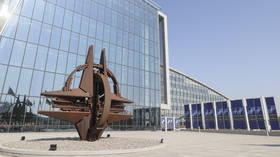Slavoj Zizek: Liberals’ ‘humanitarian’ open arms is not a solution to migrant crisis; radical economic changes are needed
Calls by Liberals to ‘open our hearts’ to immigrants from poor countries are about maintaining the status quo in the capitalist world. The solution is a radical change in the global economic system which encourages migration.
Pia Klemp, captain of the Luventa, the ship saving refugees in the Mediterranean, concluded her explanation of why she decided to refuse the Grand Vermeil medal, awarded to her by the city of Paris, with a crowd-pleasing slogan: “Documents and housing for all! Freedom of movement and residence!”
If she means that – to cut a long story short – every individual has the right to move to a country of his/her choice, and that this country has a duty to provide him/her with a residence, then we are dealing here with an abstract vision in the strict Hegelian sense: a vision which ignores the complex context of social totality.
The problem cannot be solved at this level; the only true solution is to change the system which produces immigrants. The task, then, is to take a step back from direct criticism to an analysis of the imminent antagonisms of the worldwide situation, with a focus on how our critical position itself participates in the phenomenon it criticizes.
In a recent TV debate, Gregor Gysi, a key figure in the German Die Linke (The Left) party, gave a good answer to an anti-immigrant who aggressively insisted that he feels no responsibility for the poverty and horrors in Third World countries and that, instead of spending money to help them, European states should only be responsible for the welfare of their own citizens.
The gist of Gysi’s answer was: if we don’t get responsible for the Third World poor (and act accordingly), they will come here, to us…(precisely what the anti-immigrant is so ferociously opposed to).
Also on rt.com Greens’ leader takes heat as he wants Germany to take 4,000 migrant children stuck in GreeceCynical and unethical as this reply may appear, it is much more appropriate than abstract humanitarianism. The humanitarian approach appeals to our generosity and guilt (“we should open our hearts to them, also because the ultimate cause of their suffering is European racism and colonization.”) This appeal is often combined with a strange economic reasoning that Europe needs immigrants in order to continue to expand economically, that its birth rates are falling and it is losing vitality. (It is strange to hear the Leftists invoke the typical Rightist motif of vitality). The hidden stakes of this approach are clear: let’s open ourselves to immigrants as a desperate measure to avoid much-needed radical change and to maintain our liberal-capitalist order. The logic that sustains the quoted Gysi statement is the opposite one: only a radical socio-economic change can really protect our identity, our way of life.
Caught in a social limbo
A symptom of this type of ‘Global Leftist’ is how they simultaneously reject any talk of “our way of life” and of cultural differences as a reactionary, Huntington-like stance, masking the fundamental identity (or, rather, leveling) of all of us in global capitalism, and demand of us a respect for the immigrants’ specific cultural identity, ie, not to impose on them our standards.
The obvious counter-reproach, that our way and their way of life are not symmetrical since our ‘way’ is hegemonic, makes a valid point but avoids the core of the problem - the status of universality in the struggle for emancipation. It is true that, in some sense, the refugee is a ‘neighbor’ par excellence, the neighbor in the strict biblical sense, the Other, reduced to its naked presence. Without possessions, without a home, without a determined place in society, refugees are like a stain on the social edifice, always too close to us.
Since they lack a stable place in our society, they stand for the universality of being-human – how we relate to them indicates how we relate to humanity as such. They are not just different from us – we are all different from other groups - they are, in one sense, Difference itself, as such. But, in a properly Hegelian way, universality and particularity coincide here: refugees come naked only materially, and it’s for this reason that they cling all the more to their cultural identity. They are perceived as universal, rootless, but at the same time as stuck in their particular identity.
From this fact alone, it is clear why nomadic immigrants are not proletarians – in spite of attempts by Alain Badiou and others to promulgate the refugee as the exemplary figure of today’s proletarians, “nomadic proletarians.” What makes proletarians proletarian is the fact that they are exploited: they are the key moment of the valorization of capital, their labor creates surplus-value – in clear contrast to nomadic refugees, who are not just perceived as worthless but are literally value-less, worthless “trash”/leftovers of global capital.
Also on rt.com Triumph of the right in Sweden is a result of the total failure of liberalismLeftists and capitalists dream that the new wave of immigrants will be integrated into the capitalist machine as happened back in the 1960s in Germany and then France, because “Europe needs immigrants.” But this time it isn’t working; immigrants cannot be integrated and the bulk of them remain outsiders. This fact makes the situation with immigrants and refugees much more tragic – they are caught in a kind of social limbo, a deadlock from which fundamentalism offers a false exit.
As with the circulation of global capital, refugees are put in a position of being surplus-humanity, a mirror image of surplus-value, and no humanitarian help and openness can resolve this tension, only a restructuring of the entire international edifice will do.
The usual Left-liberal retort to this is: “What about the ‘let’s work to fix the countries from which immigrants are coming in order to abolish their reasons for leaving their countries’ approach? Is it not just a subtle excuse to prevent refugees coming to us?” The answer to this is clear: in a strictly symmetrical way, “opening our hearts” to refugees here is a (not-so-) subtle way of doing nothing to change the global situation that creates them… So the solution is, simply: look at what they are doing - are they really doing it?
About us, not them
The falsity of humanitarianism is the same as that of the rejection of anthropocentrism advocated by deep ecology - there is deep hypocrisy in it. What all the talk about how we, humanity, pose a threat to life on Earth and the life of the Earth really amounts to is our worry about our own fate. Earth in itself is indifferent: even if we destroy life on it, it will just be one of – not even the greatest of – many catastrophes that have befallen it.
When we worry about the environment, we worry about our own environment, we want our own good and safe life. The falsity of this position is the same as the falsity of white anti-Eurocentric liberals who, while ruthlessly rejecting their own cultural identity and soliciting others to assert this identity, reserve for themselves the position of universality. The proponents of deep ecology, of the rights of animals, plants, and living habitats, continue to act as universal beings, as representatives of all beings – animals, and plants have no awareness of others’ interests, they just live and struggle for survival.
Also on rt.com Erdogan says Turkey can’t handle Syrian migrant influx, warns Europe of new refugee waveThe general lesson to be learned here is that one should avoid at any price cheap humanitarian sentimentalization of the world’s downtrodden. For this reason alone, Parasite (Korea 2019, Bong Joon-ho) is well-worth seeing. Here is the film’s succinct storyline:
“Jobless, penniless, and, above all, hopeless, the unmotivated patriarch, Ki-taek, and his equally unambitious family - his supportive wife, Chung-sook; his cynical twenty-something daughter, Ki-jung, and his college-age son, Ki-woo - occupy themselves by working for peanuts in their squalid basement-level apartment. Then, by sheer luck, a lucrative business proposition will pave the way for an insidiously subtle scheme, as Ki-woo summons up the courage to pose as an English tutor for the teenage daughter of the affluent Park family. Now, the stage seems set for an unceasing winner-take-all class war. How does one get rid of a parasite?”
The film avoids any moralizing idealization of the underdogs in Frank Capra style: they are the parasites, intruding, manipulating, exploitative. And we should oppose here both content and form: at the level of content, the upper-class Parks are without any doubt morally better, they are considerate, sympathetic, helping, while the underdogs effectively act like exploitative parasites. However, at the level of form, the Parks are the privileged ones who can afford to be caring and helpful, while the underdogs are real underdogs, pushed by their situation into not very gracious acts. So the solution is not to play humanitarian games but to change the situation that requires humanitarian games – or, as Oscar Wilde put it in the opening lines of his “The Soul of Man Under Socialism”:
“[People] find themselves surrounded by hideous poverty, by hideous ugliness, by hideous starvation. It is inevitable that they should be strongly moved by all this. Accordingly, with admirable, though misdirected intentions, they very seriously and very sentimentally set themselves to the task of remedying the evils that they see. But their remedies do not cure the disease: they merely prolong it.”
"Indeed, their remedies are part of the disease. They try to solve the problem of poverty, for instance, by keeping the poor alive; or, in the case of a very advanced school, by amusing the poor. But this is not a solution: it is an aggravation of the difficulty. The proper aim is to try and reconstruct society on such a basis that poverty will be impossible. And the altruistic virtues have really prevented the carrying out of this aim,” he wrote.
READ MORE: Slavoj Žižek: Until the rich world thinks 'one world,' migration will intensify
Exactly the same holds for one of the usual anti-feminist complaints: “I treat women in a kind, not-patronizing way, but they are often so aggressive towards me…”. Of course, they are, since, for them, this is often the only way to counteract their formal submission – as a rule, it is only those at the top who can afford kindness and sympathy.
Subscribe to RT newsletter to get stories the mainstream media won’t tell you.
The statements, views and opinions expressed in this column are solely those of the author and do not necessarily represent those of RT.















